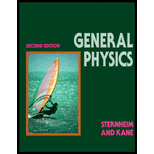
(a)
The fractional error when
(a)
Answer to Problem 26E
The fractional error when
Explanation of Solution
Write the expression for the nonrelativistic approximation for kinetic energy of the particle,
Here,
Write the expression for the relativistic exact kinetic energy of the particle,
Here,
Write the expression for the fractional error,
Here,
Substitute (I) and (II) in (III),
Conclusion:
Substitute
Therefore, the fractional error when
(b)
The fractional error when
(b)
Answer to Problem 26E
The fractional error when
Explanation of Solution
Write the expression for the nonrelativistic approximation for kinetic energy of the particle,
Here,
Write the expression for the relativistic exact kinetic energy of the particle,
Here,
Write the expression for the fractional error,
Here,
Substitute (I) and (II) in (III),
Conclusion:
Substitute
Therefore, the fractional error when
Want to see more full solutions like this?
Chapter 25 Solutions
General Physics, 2nd Edition
- Explain the difference between time-dependent and independent SchrÖdinger's equations.arrow_forwardA linear particle accelerator using beta particles collides electrons with their anti-matter counterparts, positrons. The accelerated electron hits the stationary positron with a velocity of 98 x 106 m/s, causing the two particles to annihilate.If two gamma photons are created as a result, calculate the energy of each of these two photons, giving your answer in MeV (mega electron volts), accurate to 1 decimal place. Take the mass of the electron to be 5.486 x 10-4 u, or 9.109 x 10-31 kg.Note: Assume that the kinetic energy is also converted into the gamma rays, and is included in the two photons.arrow_forwardLet N=0 A. Step by step derive Nopt(N)arrow_forward
- Aliens visiting Earth are fascinated by baseball. They are so advanced that they have learned how to vary U to make sure that a pitcher cannot throw a strike with any confi dence. Assume the width of the strike zone is 0.38 m, the speed of the baseball is 35 m/s, the mass of the baseball is 145 g, and the ball travels a distance of 18 m. What value of h is required?arrow_forwardGiven the potential function V = x2y(z+3), determine the electric potential at (3, 4, -6).arrow_forwardA linear particle accelerator using beta particles collides electrons with their anti-matter counterparts, positrons. The accelerated electron hits the stationary positron with a velocity of 29 x 106 m/s, causing the two particles to annihilate.If two gamma photons are created as a result, calculate the energy of each of these two photons, giving your answer in MeV (mega electron volts), accurate to 1 decimal place. Take the mass of the electron to be 5.486 x 10-4 u, or 9.109 x 10-31 kg.arrow_forward
- (2nx sin \1.50. 2nz Consider the case of a 3-dimensional particle-in-a-box. Given: 4 = sin(ny) sin 2.00. What is the energy of the system? O 6h?/8m O 4h²/8m O 3h2/8m O none are correctarrow_forwardConsider a self-gravitating collection of particles. In such a situation, the mean kinetic energy of the particles will be 1/2 mv^2 = GM | 2R. This is approximate, and arises from something called the virial theorem that you will learn in upper level undergraduate classical mechanics. From this information, figure out what fraction of particles will be above the escape velocity from the collection of particles. (This calculation is relevant for understanding why star clusters evaporate over time).arrow_forwardA hole is the absence of an electron at a potential location for its existence. Given that a hole is the result of the absence of an electron, its mass should be zero. However, we regard the effective mass of a hole to be negative. Why?arrow_forward
- Please answer the ff and show the step by step solution including its units:arrow_forwardQ # 01: Consider a ball of 100g dropped with zero velocity from the height of 2m. Estimate its total energy in eV units. Using the energy conservation, find out the velocity as a function of position of the ball. Sketch its phase trajectory. Calculate the time it takes to reach the ground. Let’s assume that it is bounced back with no loss in its total energy.Will it reachthe same height? Make an analytical argument. What if the collision with the ground is not elastic and it loses some of its energy (which energy?).The ball will eventually come to rest after bouncing few times. Sketch the phase trajectory for the whole duration. What is the range of total energy of this system? Can the energy of this systemassume discrete values? Explain mathematically.arrow_forwardMyons are little fellows similar to electrons in terms of their charge. But they are somewhat bigger with a mass 206 times larger than the electrons. Compute the energy of a hydrogen-like atom with a myon on its orbit! Compare the kinetic energy with the (Coulomb) potential energy and the gravitational energy (as the myon’s mass is much more than the electron’s mass).arrow_forward
 University Physics Volume 3PhysicsISBN:9781938168185Author:William Moebs, Jeff SannyPublisher:OpenStax
University Physics Volume 3PhysicsISBN:9781938168185Author:William Moebs, Jeff SannyPublisher:OpenStax
